By closely monitoring trends and developments in the local and global labour markets, we provide insights into the skills needed to drive economic growth, enhance productivity, and promote wellbeing. Our evidence-based mixed methodology approach ensures that decisions and strategies are rooted in reliable data, facilitating informed policy-making and effective planning. If you would like to set a meeting with us, kindly get in touch through the ‘Contact’ section.
Our remit includes:
- Skills Research and Analysis: We conduct scoping reviews, and analysis of current and future skills needs. Our findings provide valuable insights into emerging trends, demand-supply dynamics, and potential skills gaps.
- Policy Recommendations: We develop evidence-based policy recommendations that support decision-making processes. Our aim is to contribute to policies that promote skills development, enhance employability, and foster economic growth and wellbeing.
- Industry Engagement: We collaborate closely with industry stakeholders, including employers, professional associations, and trade unions. By understanding their specific needs and challenges, we assist in identifying avenues for skills development in the short, medium and long-term.
- Education Collaboration: We work in partnership with educational institutions to ensure that their programmes, curricula and career guidance services align with the anticipated future skills. We provide guidance on emerging trends and encourage collaboration between academia and industry to bridge the gap between education and employment.
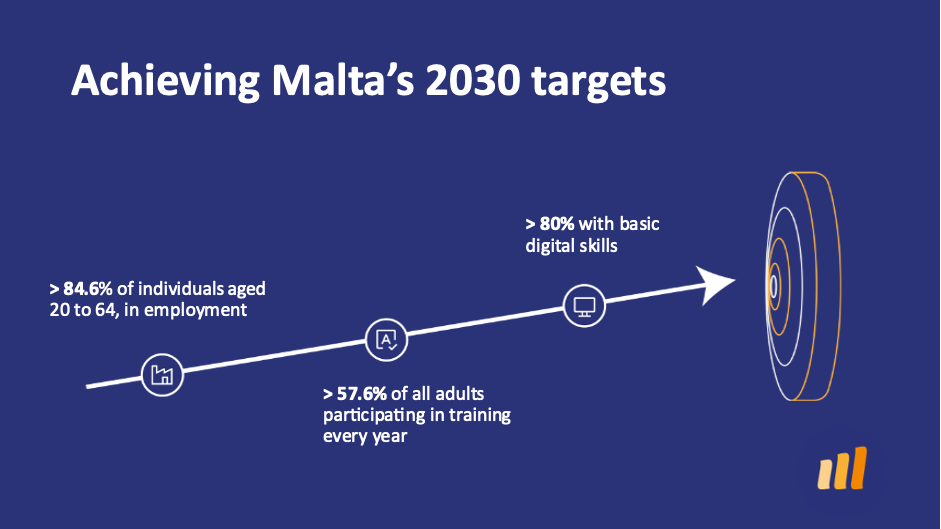
In-demand Skills
Currently, evidence suggests that the most in-demand future skills encompass a combination of basic skills, transversal skills, and broad technical skills, alongside green and digital skills. These skill sets are crucial for individuals to thrive in the rapidly evolving job market and contribute to sustainable economic growth and wellbeing. By focusing on the development of these skills, we can ensure that individuals are well-prepared to meet the demands of the future workplace and drive innovation and productivity across diverse industries.

Four Pillars of Evidence
At the National Skills Council, our evidence-based approach is guided by the four pillars of evidence presented by the Centre for Evidence-Based Management in the Netherlands. These pillars serve as the foundation of our methodology and ensure qualitative and quantitative inputs are continually analysed.
- Research Evidence: We employ a robust research methodology to gather and analyse data related to skills needs, labour market trends, and emerging industry demands. By utilising a wide range of quantitative and qualitative research techniques, we generate evidence that forms the basis of our insights and recommendations.
- Professional Expertise: Our technical unit ensures continuous liaison with various experts and experienced professionals. High-level and technical-level meetings are continually held with professionals with expertise in various fields, including labour market analysis, skills forecasting, policy development, education planning, and industry engagement. By combining their knowledge and experience, we bring a multidisciplinary perspective to our advisory services, enhancing the quality and relevance of our recommendations.
- Stakeholder Insights: We actively engage with a diverse range of stakeholders, including policymakers, professional bodies, industry representatives, education leaders, educators, trainers, and individuals in the workforce. By listening to their perspectives, challenges, and aspirations, we ensure that our advisory services are informed by the voices of those directly affected by skills development policies and strategies.
- Local Contextualisation: Recognising the importance of the local context, we integrate specific Maltese data, and trends into our evidence. This contextualisation ensures that our advisory services are tailored to the unique needs and challenges of the Maltese labour market, maximizing their relevance and effectiveness.

By adhering to these four pillars of evidence, we strive to provide evidence-based guidance to our stakeholders. Our commitment to reliable data, professional expertise, stakeholder engagement, and local contextualization enables us to anticipate present and future skills, empowering decision-makers to shape policies and strategies that drive Malta's economic growth and prosperity. We work closely with educational institutions to ensure that curricula and training programs are responsive to the changing demands of the job market.
The Twin Transition
In today's rapidly evolving world, preparing for the twin transition is crucial for individuals and industries alike. We recognise the significance of green and digital jobs in shaping the future economy and social wellbeing. By understanding the evolving demands of these sectors, we can identify the specific skills and competencies needed. We will explore targeted training programmes, upskilling initiatives, and continuous learning opportunities that can bridge the gap between current skills and future requirements. Together, let's pave the way for a smooth transition, ensuring a skilled workforce ready to seize the opportunities of the twin transition.
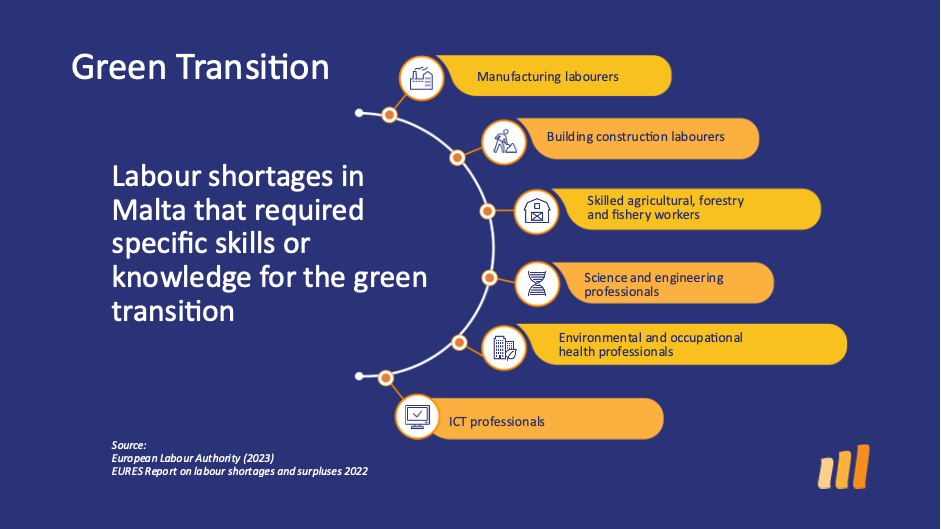
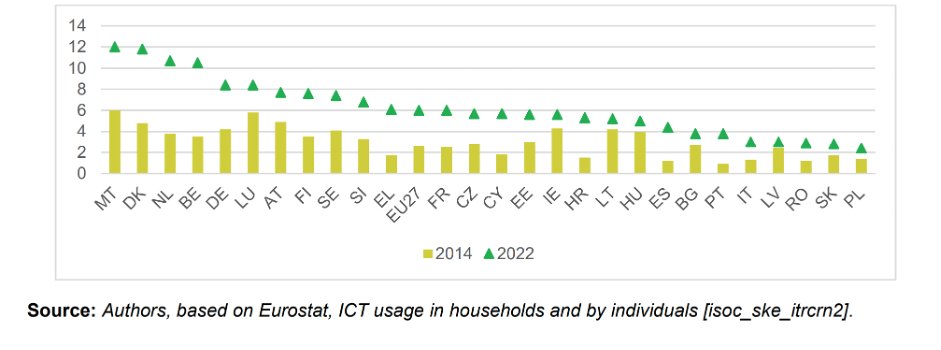
In the digital age, digital literacy and competence have become fundamental requirements for individuals to thrive in the modern workforce. By integrating digital skills into various subjects and age groups, we can empower learners to navigate the digital landscape confidently and harness the potential of technology. This includes promoting critical thinking, problem-solving, creativity, and adaptability in using digital tools and platforms. Similarly, the urgent need for sustainable development has brought about the necessity for green skills. We advocate for the integration of environmental awareness and sustainability principles across all educational disciplines. By instilling an understanding of ecological challenges and fostering a sense of responsibility towards the environment, we prepare learners to become environmentally conscious citizens and contributors to a sustainable future.
By emphasising the cross-cutting nature of digital and green skills, we encourage educators to incorporate these skills into diverse learning experiences and curricula. We promote innovative pedagogical approaches that go beyond traditional teaching methods, such as project-based learning, experiential learning, and collaborative problem-solving. These methodologies empower learners to develop transversal skills while addressing real-world challenges, enhancing their ability to adapt, innovate, and contribute meaningfully to society.
What is Generative Pre-trained Transformer (GPT) and what makes a job exposed to GPT?
GPT stands for "Generative Pre-trained Transformer." It is a type of advanced computer programme that understands and generates text. It uses a special kind of technology called a neural network, specifically the Transformer architecture. The programme has been trained on a huge amount of data, which helps it learn a lot about language and how to create its own sentences.
GPT has the potential to significantly impact the future of work due to its advanced language generation capabilities. As these models continue to improve, they can assist with various tasks, including content creation, customer service, translation, and data analysis. By automating repetitive and time-consuming tasks, GPT can enhance productivity and efficiency in different industries.
Additionally, GPT can assist in decision-making processes by analysing and summarising large amounts of information, enabling faster and more informed choices. This technology also has the potential to provide personalised recommendations, optimise workflows, and support creative problem-solving.
However, the increasing use of GPT also raises questions and challenges. Ethical considerations, such as bias in training data and potential misuse, need to be addressed. The evolving role of humans in collaboration with AI systems and the need for continuous learning and up-skilling are crucial aspects to navigate the changing landscape of work.

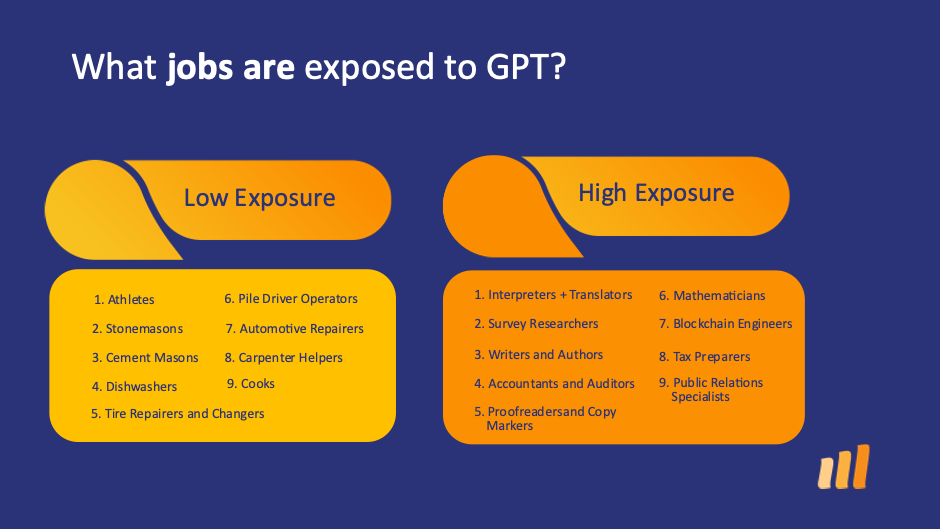
Largest Job Growth and Job Declines
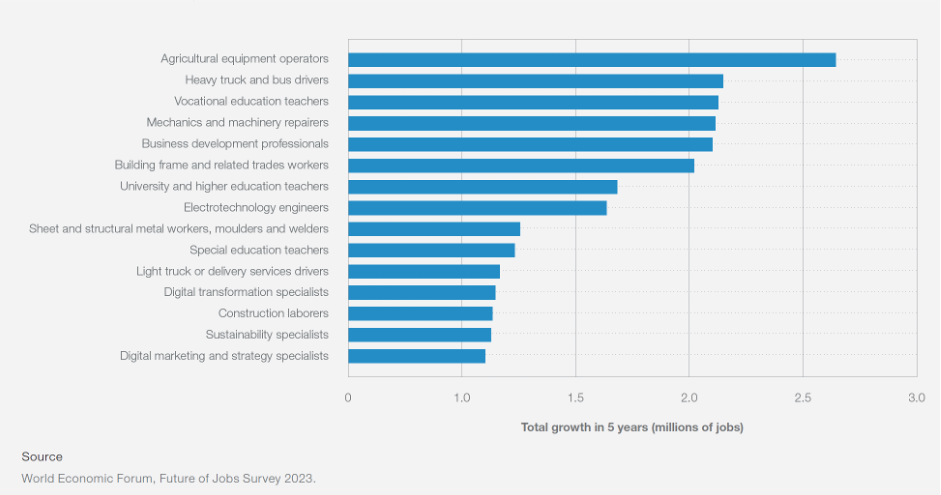
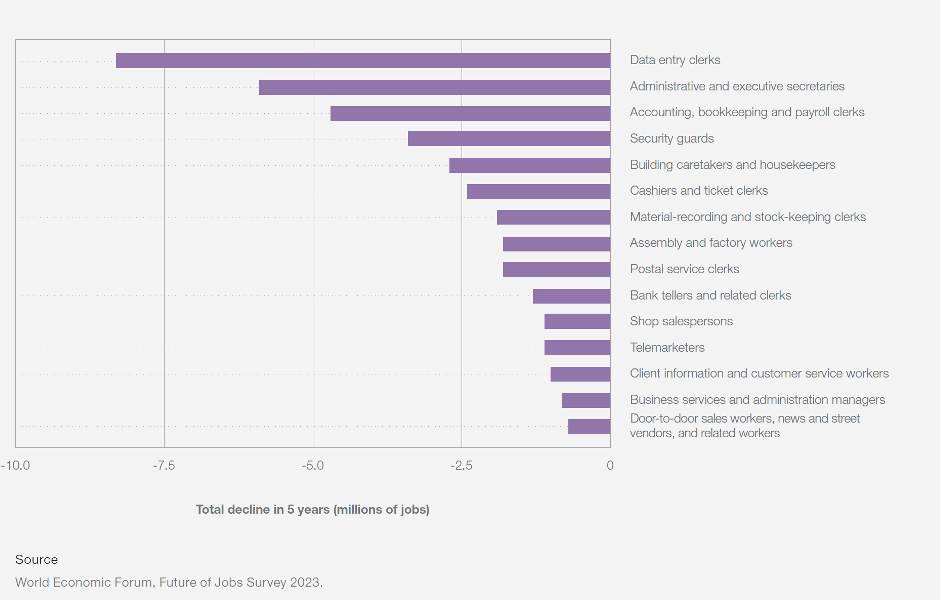
What are the influencing factors for future skills and the future of work?
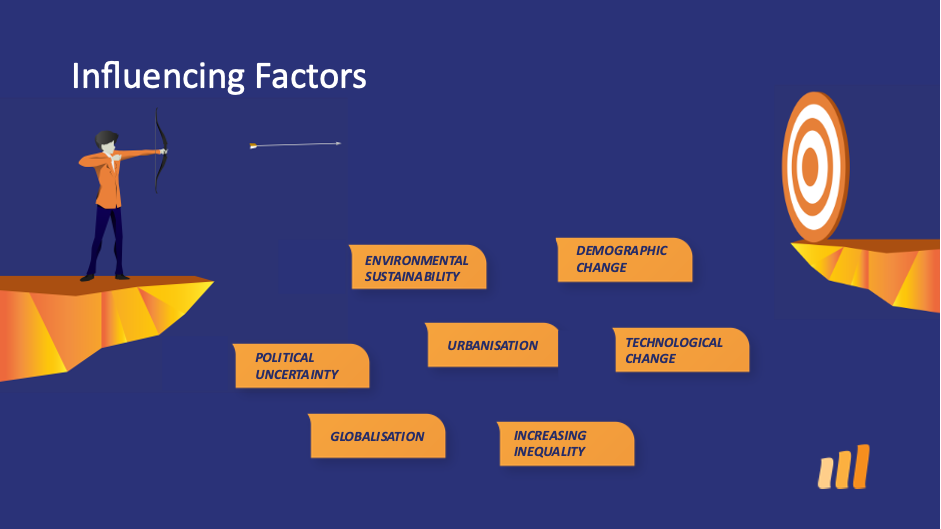

Technical Skills vs Transversal Skills

At the National Skills Council, we recognise the importance of fostering transversal skills in learners across all ages and subjects. With the right support and systems in place, innovative pedagogies can play a crucial role in nurturing these essential skills, along with the right knowledge and attitudes. We emphasise the significance of looking at all technical skills through the digital and green lens, as cross-cutting themes in education.


At the National Skills Council, we believe that by promoting innovative pedagogies and cross-cutting skills, we can empower learners to become agile, responsible, and sustainable contributors to society. Join us in our mission to cultivate a future-ready workforce that embraces digital advancements, environmental stewardship, and lifelong learning. Together, we can shape a brighter future for Malta and its learners.
A Skills-First Approach
We recognise the significance of initiating a national debate on the skills-first approach to hiring. In today's dynamic job market, traditional employment practices based solely on qualifications and experience may not fully capture an individual's potential or adaptability. Embracing a skills-first approach enables employers to focus on the specific competencies and transversal skills that are essential for success in the evolving workplace.
By fostering a national dialogue on the importance of skills-based hiring, we aim to promote a more inclusive and equitable labour market. This approach provides opportunities for individuals from diverse backgrounds, including those with non-traditional educational paths or career shifts, to showcase their capabilities and contribute meaningfully to the workforce. Moreover, it encourages lifelong learning and skills development, as individuals are encouraged to continuously enhance their skill sets to remain competitive in the job market.
Validation of informal and non-formal learning is the process of assessing the skills, knowledge, and competencies an individual has acquired. This is benchmarked against learning outcomes measured and evaluated by a competent body against the said standard.
Join us in this national conversation on the skills-first approach to hiring. By embracing a mindset that values skills and competencies, we can unlock the potential of individuals, foster a more inclusive job market, and drive economic growth through a highly skilled and adaptable workforce. Together, let us pave the way for a future where skills are the key to unlocking opportunities for all.

Key Challenges

Despite the progress made in skills development, Malta still faces certain challenges in addressing the skills gap. Rapid technological advancements and shifting industry demands create a constant need for up-skilling and re-skilling. It is crucial to bridge the gap between the skills possessed by the workforce and those required by the evolving job market.
- One challenge is ensuring the alignment between educational programs and industry needs. Close collaboration between educational institutions and employers is essential to ensure that curricula and training programs are up-to-date, relevant, and equip individuals with the skills demanded by the labor market. Additionally, promoting lifelong learning and encouraging individuals to continuously upgrade their skills are crucial factors in tackling the skills gap effectively.
- Another challenge lies in addressing the disparities that exist across different sectors and regions. It is important to identify and address specific skills gaps prevalent in particular industries or regions, ensuring that no sector or area is left behind in terms of skills development. This requires targeted interventions, tailored strategies, and support for industries that face significant skills shortages.
- Furthermore, promoting awareness and changing societal perceptions about the value of technical and vocational education and training (TVET) is essential. Enhancing the attractiveness and prestige of TVET programs can help reduce the stigma associated with non-academic pathways and encourage more individuals to pursue vocational education, which plays a vital role in meeting the demand for skilled workers in various sectors.
Addressing these challenges requires a comprehensive approach involving collaboration between government agencies, educational institutions, industry stakeholders, and the broader community. As shown in figure 16, the National Skills Council of Malta is committed to working in partnership with all stakeholders to overcome these challenges, identify innovative solutions, and ensure that Malta has a highly skilled workforce that can thrive in the face of future economic and technological transformations.
